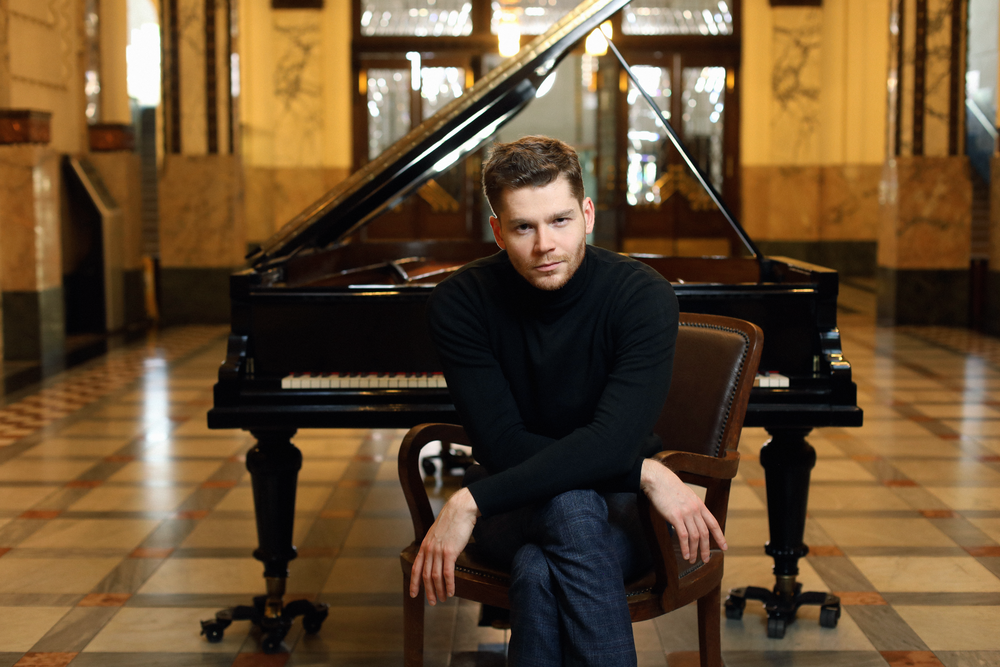Andrey Gugnin’s track record is so strong that winning the new Classic Piano International Competition in Dubai earlier this year might have seemed the icing on the cake. It has brought him a prize of €100,000 plus ten concerts with a total fee of €50,000. Yet the 37-year-old Russian pianist is not one either to rest on his laurels or to suspend his sense of self-criticism, even in the face of such a triumph.

“The prize money was unique for a classical music competition, so it felt really huge,” Gugnin acknowledges, speaking to me on a video call from the other side of the world – I have caught him on tour in Australia. “But once that first burst of excitement passes, you need to think about what to do next.”
His career launched in earnest when he won the Sydney International Piano Competition in 2016. There, too, he met the British violinist Tasmin Little, who grabbed him to become her last duo partner before she retired from concert life, helping to introduce him to UK audiences. Hyperion snapped him up as well, and his first album for them, Shostakovich’s 24 Preludes and Piano Sonatas Op.12 and Op.61, promptly won BBC Music Magazine’s Instrumental Award.
The Dubai prize has been, he says “a very big practical help” at a time when his life is being buffeted by change, much of it far beyond his control. The first thing one sees on his website biography is the hashtag #standwithukraine and an unequivocal statement:
There are times when you cannot remain silent.
I’m against war. There is nothing worse than savage violence and bloodshed.
I, myself, have Ukrainian ancestors. I have close friends in Ukraine. Lots of them.
As a Russian I feel ashamed and heartbroken for the actions of my state.
This is an unspeakable tragedy.
Stop the war!
“I left Russia and lived for a while in Croatia,” Gugnin says. “Then last year, I moved with my girlfriend to Amsterdam. All these changes are not easy...” In this context, the prize money and the extra concerts with which the competition has showered him have been manna from heaven.
Gugnin was born in Moscow and lived there until the current war began. His family, he says, is not especially musical, but for an aunt who studied at the Moscow Conservatory. “My father and brother are both mathematicians – if I had not gone into music, perhaps that would also be my field.”
He began piano lessons aged seven: “It’s something which many kids of my age in Russia would do – it was a common thing to bring kids to music school, just for a general hobby, and I enjoyed it. One legacy of the Soviet Union was that there were a larger than average number of music schools, and it was a popular idea that a kid should do a lot of extra activities – art, music, ballet, sport, group interests – which would run in parallel to general schooling.”
At first Gugnin studied with Lev Naumov: “He was a wonderful professor, a pupil of Heinrich Neuhaus, and I was supposed to go into his class at the Moscow Conservatoire. But sadly, he died before that could happen, so I had to find another teacher. I was already acquainted with Vera Gornostayeva; she was very empathetic about what had happened, and through all the conservatoire years I studied with her, along with Vadim Kholodenko and Lukas Geniusas.” The three young pianists together recorded a tribute to their late professor marking her 90th anniversary.
Among his other chief influences, Gugnin says, is Mikhail Pletnev: “I have always been fascinated by his artistry – from the earliest age I can still recall some of the performances of his that I saw on TV or early CDs that I had. At first I couldn’t understand that a human being could do such things! I admired all the great Russian pianists, especially Emil Gilels for the warmth of the sound and how naturally he could present the essence of the music. That was a big inspiration.”
He admired many recordings by Arturo Benedetti Michelangeli and Glenn Gould – the latter not only in Bach, but also in the Beethoven’s Hammerklavier. “It is a weird account, but I really loved it, perhaps partly because it was the very first recording of the Hammerklavier that I ever heard. I remember listening through my headphones: at some point I completely lost track of time and was so immersed in its world – a sonata that is absolutely beyond its time.”
Gugnin’s reflective nature, as well as his daily life, has clearly been impacted by the heinous situation precipitated by Russia’s invasion of Ukraine. It is tempting to wonder if music can help him – and others – through times of trouble. “Quite often I hear people say that, and I’m really happy to hear this feedback when I play,” he says. “I see that people mean it and that music somehow brings a certain peace to them.
“But from the performer’s point of view, it depends. If I am on stage, if it’s somehow going well and I catch the flow of inspiration, it’s a great feeling: it completely fills you and you live the moment fully. But it doesn’t help the worst things, so afterwards it just washes away, at least in my case. Sometimes I feel that I don’t really know how to play! This can lead to a good outcome at later stages with new understandings, but you have to adjust…”
The reviews of Gugnin’s latest album on Hyperion, devoted to Grieg’s Holberg Suite, Ballade and a selection of the Lyric Pieces, suggest that he is adjusting rather well. According to International Piano: “Andrey Gugnin is a true poet of the keyboard and his commitment shines through in every bar.” His recording of Shostakovich Preludes and Piano Sonatas had been termed “spectacular” and was soon followed by Scriabin’s Mazurkas and a Homage to Godowsky in the 150th anniversary of the composer’s birth. What drew him to the very different and notably intimate world of Norway’s musical genius-in-chief?
“Grieg is an interesting case,” he says, “a composer who is obviously very famous and popular, but at the same time under-estimated. His piano pieces are sometimes perceived as leaning towards salon music, but I find that his Lyric Pieces are works of absolute genius that touch people in a profound way. His Ballade is rarely played, but its opening is very dramatic and rich and when it starts you don’t expect the tremendous range of intensity which it brings us towards the end. The Holberg Suite is more popular, but mostly people listen to the orchestral version. I wanted to show that the original version is great too!” Recently he has been hard at work on his next album, devoted to colourful transcriptions of Tchaikovsky and Stravinsky ballet music. “I’m very grateful for my connection with Hyperion and that we are continuing the collaboration,” he says.
This season is bringing a wealth of debuts, first of all at the Konzerthaus in Vienna: here Gugnin is playing the complete Liszt Transcendental Etudes on 2nd October, which he recorded a while ago on the Piano Classics label. He turns out to have a penchant for complete cycles. “I love playing this Liszt cycle because the progression of the narrative is so intense and rich. Each one changes its meaning completely in the context of the whole series. Again, you can reach a state beyond the logic of time and space.” The Rachmaninov preludes are another favourite: “I find the growing intensity of it is really fulfilling. It’s like a really big novel, Dickens or Henry Fielding! It’s as if it contains a whole life.”
For the future he would love to add the complete Preludes and Fugues by Shostakovich (“it certainly will require some time!”) and the Messiaen Vingt Regards: “such a profound work, and played complete it is totally different from listening to individual movements.” He notes that in the past piano recitals by the likes of Josef Hoffman and Ferruccio Busoni could last up to three hours. “That length is something we’re losing, which is understandable. We have simply more stuff happening around us and we consume smaller bits of information. It’s harder now to hear a complete cycle in a live performance and promoters may be afraid to programme them.”
With his travelling commitments growing fast – the Asian promoters in particular, but also Australia, plus Japan twice a year – “things are developing very well,” he says. The chamber music field is wide open, notably with the violinist Roman Simovic: “I really love chamber music and we are trying to establish a couple of trios.” And in London he is planning a series of concerts at the brand-new Bechstein Hall on Wigmore Street when it opens its doors at last. “So,” he quips, “I need to practise!”
Andrey Gugnin performs Liszt’s Transcendental Etudes at Wiener Konzerthaus on 2nd October.
This article was sponsored by the Classical Music Development Initiative.


